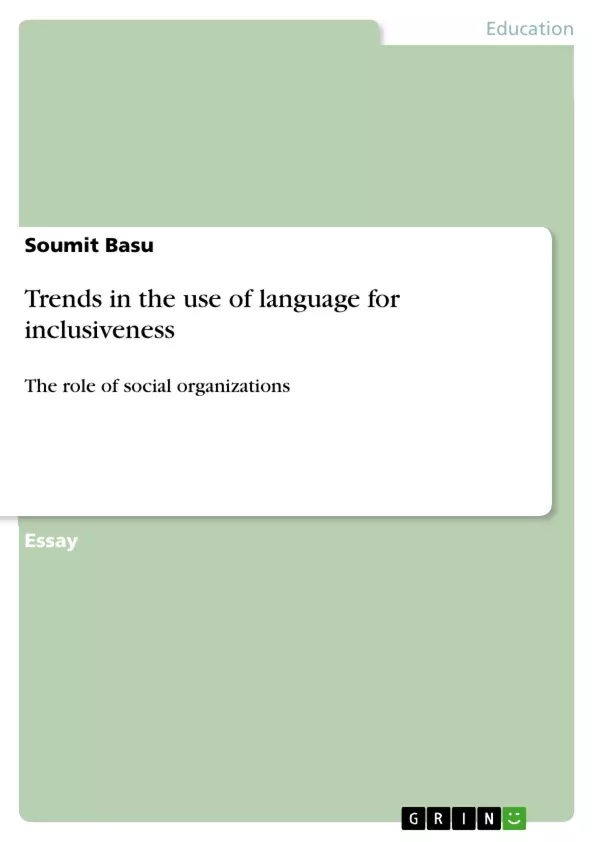As society is getting more and more inclusive, the way we communicate is also changing. In the ancient and the medieval periods, those people who were different were excluded from the society. Neither was medical science very advanced nor the people’s mindsets. The persons with disabilities were ostracized, marginalized or killed at birth. But today, we need to create a society where not only the physical well being but also the psycho-social aspects need to be taken into consideration.
In the 21st century a lot these aspects are emphasized in education. Many guidelines have been prepared on how to communicate in reference to persons with disabilities. In this paper, the author has mentioned most of these suggestions of style manuals. Further, the role of social organizations like schools, communities, media, etc., particularly in India to incorporate these guidelines or how far have these been incorporated in the system has been looked into. The author has also included some examples of prevailing gender stereotypes with special reference to people of the third gender.
The author has also looked into the reasons as to why these pejorative expressions should not be used. It is a well known fact that the proper use of words can make a good impression and can be a reflection of a person’s character and personality. It can also help to make new friends and create goodwill. Sounds and words have a healing effect when used appropriately or conversely, it has the potential to create negative feelings. If social organizations are not aware and do not disseminate this bias free language, then people will tend to make errors in communication as a result of their influence.
Frequently asked questions
What is the abstract about?
The abstract is not provided in the extracted text.
What are the key themes and objectives of the "Language Preview" document?
The document explores the use of politically correct language, the psychological effects of negative expressions, and the linguistic backgrounds of potentially offensive terms. The main objective is to assess whether social organizations (e.g., media, schools) use appropriate terms when referring to disadvantaged groups and disabled persons.
What is the introduction about?
The introduction discusses the evolution of language and societal attitudes towards individuals with disabilities. It highlights the shift from exclusion and derogatory terms to a more inclusive approach, emphasizing the importance of psychosocial well-being. It also outlines the objectives of the study.
What are the objectives of the study?
The objectives of the study are:
- To find out whether social organizations like media and schools are using politically correct terms or not to refer to disadvantaged groups and disabled persons.
- To understand the possible psychological effects of negative expressions.
- To explore the linguistic backgrounds of such words.
What does the "Review of Literature" section cover?
The review of literature mentions studies by Richard Rieser and Mason on everyday language usage related to disability. It also indicates the use of critical books, case studies, and internet research for gathering information.
What materials and methodology were used?
Various critical books and case study books were read, internet research was conducted, and electronic media sites were researched for case studies.
What are the "Results and Discussion" of the study?
This section delves into bias-free language guidelines as provided by writers' style manuals like the American Psychological Association. It gives specific examples of expressions to be used in reference to disabled people. It also highlights the issues surrounding terms related to the third gender and the misuse of archaic expressions in media reports.
What are some examples of problematic language usage?
Examples cited include:
- Using "handicapped" as it implies a burden was created from the outside.
- Referring to people as "the disabled" or "the blind" instead of saying "a person with a disability" or "a person with visual impairment."
- Using "wheelchair bound" which implies suffering from a physical impairment.
- Using "crippled" which has a derogatory historical background.
What is the relation between "faces" and politeness in linguistic pragmatics?
Linguistic pragmatics has broken down the levels of politeness into faces. Faces are the subconsciously constructed images of the `I', and politeness seeks to inform the various dimensions of these image building and destroying words and phrases. There is a "positive face" and a "negative face". The study highlights how certain words and phrases can impact these "faces" and affect communication.
What are some recommendations made in the text?
The terminology for expressions in social situations is shifting from single words that are clichéd, generalized, and have a historical stigma attached to these to more compound words and phrases that are indirect and do not seek to stereotype. But when coining new expressions or trying to speak consciously, it should neither be done in a flippant and superficial manner. It also must be subtle and scientific in nature.
What's the conclusion about?
Social organizations should be given training for proper usage and be updated. Constant feedback should be taken from the personnel regarding the training. There should also be explanation to students on the contemporary trends in language usage to avoid archaic words in their own compositions.
What are the references cited?
The document cites various sources, including:
- American Psychological Association Publication Manual
- Articles and resources related to inclusive language and gender-neutral pronouns
- Books on education, equality, and human rights
- Daniel Goleman's works on social intelligence
- Wikipedia articles on Jungian archetypes, political correctness, and transgender issues
- Media articles highlighting problematic language usage
- The study of language.New Delhi:Cambridge University Press.
- Arbeit zitieren
- Soumit Basu (Autor:in), 2016, Trends in the use of language for inclusiveness, München, GRIN Verlag, https://www.grin.com/document/337675



